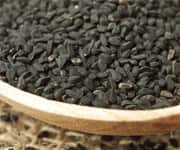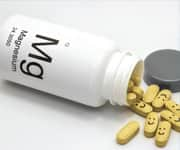Life Extension Magazine®
Active Component In Green Tea Could Reduce Pancreatic Cancer Risk | |
A study published online in the journal Metabolomics found that the powerful catechin in green tea called EGCG (epigallocatechin-3-gallate) changed the metabolism of pancreatic cancer cells by suppressing the expression of the LDHA (lactate dehydrogenase) enzyme associated with cancer metabolism.* Study author Dr. Wai-Nang Lee, of the Los Angeles Biomedical Research Institute, and colleagues also discovered an enzyme inhibitor called oxamate, which is known to reduce LDHA activity, functioned in a similar manner and also disrupted the metabolic system of pancreatic cancer cells. Metabolism is the chemical processes that occur in an organism’s cells, either normal or cancerous, that keeps cells alive and multiplying. “Scientists had believed they needed a molecular mechanism to treat cancer, but this study shows that they can change the metabolic system and have an impact on cancer,” said Dr. Lee. “By explaining how green tea’s active component could prevent cancer, this study will open the door to a whole new area of cancer research and help us understand how other foods can prevent cancer or slow the growth of cancerous cells. “This is an entirely new way of looking at metabolism. It is no longer a case of glucose goes in and energy comes out,” continued Dr. Lee. “Now we understand how cancer cell metabolism can be disrupted, and we can examine how we can use this knowledge to try to alter the course of cancer or prevent cancer.” Editor’s Note : A 2012 study recommended that consuming green tea may reduce risk of digestive system cancers in women, while a separate study found that EGCG delivered directly into tumors made two-thirds of them shrink or disappear entirely within a month with no side effects to normal tissue. —A. Kessler |
|
| Reference | |
* Metabolomics . 2014 May 30. |
|
Intense Exercise Linked To Atrial Fibrillation | |
The results of a study published in the journal Heart found a link between men who exercised intensely for more than five hours a week and an increased risk for developing an irregular heartbeat known as atrial fibrillation, a risk factor for stroke.* Researchers from Karolinska Institute, Sweden, analyzed 44,410 men between the ages of 45 and 79 regarding their exercise habits at the ages of 15, 30, 50, and during the past year, when their average age was 60. They also monitored and recorded the heart health of these men for an average of 12 years, looking in particular for atrial fibrillation. Those that worked out intensely—more than five hours a week at the age of 30—were 19% more likely to have an irregular heartbeat by the time they turned 60 than the men who exercised less than one hour per week. The risk level rose to 49% among those who worked out more than five hours per week at the age of 30 and exercised less than an hour by the age of 60. However, the men who exercised less intensely—walking briskly or cycling—for an hour a day or more at age 60 were 13% less likely to develop atrial fibrillation than those who got no exercise at all. Editor’s Note : In an accompanying editorial, researchers Eduard Guasch and Lluís Mont say that when it comes to exercising “maximum cardiovascular benefits are obtained if performed at moderate doses, while these positive aspects are lost with (very high) intensity and prolonged efforts.” —A. Kessler |
|
| Reference | |
* Heart. 2014 May 14. |
|
Zinc Supplementation Supports Prevention Of Premature Mortality In Malnourished Children | |
The Cochrane Library published a review on May 15, 2014, which concluded that supplementing with zinc reduced the risk of morbidity and mortality in malnourished children, while improving growth.* Professor Zulfiqar Bhutta, of the Center of Excellence in Women and Child Health at Aga Khan University in Karachi, Pakistan, and colleagues selected 80 randomized controlled trials that included a total of 205,401 boys and girls between the ages of 6 months and 12 years for their review. They found that supplementing with zinc decreased the risk of diarrhea, a major cause of death among children in developing countries. Zinc supplementation was also associated with a reduction in the risk of mortality from diarrhea, lower respiratory tract infection, and malaria, as well as death from all causes. Editor’s Note : Additionally, children who were supplemented with zinc were slightly taller at the end of the trials included in the current study, in comparison with those who did not receive the supplement. —D. Dye |
|
| Reference | |
* Cochrane Database Syst Rev. 2014 May 15. |
|
Metformin Aids In The Stabilization Of Metastatic Prostate Cancer | |
|
An article published in European Urology reports the outcome of a Swiss trial involving men with castration-resistant prostate cancer (defined as a testosterone level of less than 50 ng/dL with progressive disease) who were given the antidiabetic drug metformin.* For the trial, 44 nondiabetic men who had not been treated with chemotherapy for progressive, metastatic castration-resistant prostate cancer causing few or no symptoms were given 1,000 mg metformin twice a day until disease progression. Assessment of disease status—including computed tomography of the abdomen, pelvis, and chest, bone scanning, and serum prostate cancer specific antigen (PSA) level measurement—was conducted every 12 weeks. After initiation of metformin therapy, 36% of the group was progression-free at 12 weeks, and 9% were still progression-free at 24 weeks. PSA doubling time, a measure of disease progression, was beneficially prolonged in 52% of patients after the initiation of metformin. Editor’s Note : The drug was also associated with improved insulin sensitivity. —D. Dye | |
| Reference | |
* Eur Urol. 2014 Jan 4. | |
Black Cumin Seed Oil Improves Abnormal Semen Quality In Infertile Men | |
Phytomedicine published the results of a clinical trial that revealed black cumin seed oil, Nigella sativa L., markedly boosts semen quality, motility, and volume with no adverse effects.* In the study, researchers from Payame Noor University and Shahid Beheshti University of Medical Sciences, in Tehran, Iran, and Institute of Medicinal Plants, Karaj, Iran, tested 34 infertile men with sperm counts below 20 million per mL, or had less than 30% abnormal sperm morphology or type A and B (fast-moving forward and slow-moving forward) motility less than 25 to 50% respectively. They also tested the pH of the semen since pH often determines the level of motility of the sperm. The men received either 2.5 mL of Nigella sativa L. seed oil or a placebo twice each day. After eight weeks, the researchers again tested the motility, morphology, and sperm counts for the participants. They found the group supplemented with 5 mL of black cumin seed oil daily for two months had significantly higher sperm count, better motility and morphology, and improved pH levels compared to the placebo group and compared to the beginning of the study. Editor’s Note : Sperm counts around the world have been dropping. A 2012 study by researchers at the Institut de Veille Sanitaire (Sanitary Surveillance Institute), Saint Maurice, France, of around 26,000 men with an average age of 35 found that sperm concentrations dropped 32% over a 17-year period by a change rate of about 1.9% a year. —A. Kessler | |
| Reference | |
* Phytomedicine 2014 May 15. | |
A Purpose-Driven Life Reduces Mortality | |
An article published in Psychological Science links having a purpose in life to a reduced risk of premature mortality.* “Having a purpose in life has been cited consistently as an indicator of healthy aging for several reasons, including its potential for reducing mortality risk,” write authors Patrick L. Hill and Nicholas A. Turiano. “In the current study, we sought to extend previous findings by examining whether purpose in life promotes longevity across the adult years.” By evaluating data from over 6,000 men and women enrolled in the Midlife in the United States study, Hill and Turiano uncovered an association between a greater sense of purpose and a reduced risk of dying over 14 years of follow-up. “Our findings point to the fact that finding a direction for life, and setting overarching goals for what you want to achieve, can help you actually live longer, regardless of when you find your purpose,” Dr. Hill noted. Editor’s Note : The authors are currently attempting to determine if the reason for the study’s finding is due to the practice of healthier lifestyles among those having a purpose. They also plan to explore the effect of life purpose on other aspects of well-being. —D. Dye | |
| Reference | |
* Psychol Sci. 2014 May 8. | |
New Home Healthcare Diagnostic Tool | |
A miniature medical lab that’s small enough to hold in your hand will soon allow consumers to run a variety of diagnostic tests from the comfort of their own homes. Known as the Cue, the device can test and track five key health indicators—testosterone, vitamin D, the flu virus,luteinizing hormone (which indicates a woman’s fertility), and C-reactive protein (CRP, which serves as a marker of inflammation). Cue developers identify these as the most common tests run by health care practitioners in the US. Tests are undertaken as the consumer submits a small sample (blood, nasal swab, or saliva) into a customized cartridge, which is then placed inside the Cue. Within moments, it’s analyzed and the information is sent to your smartphone or tablet where it’s displayed in an easy-to-read format. The device is expected to retail in the spring of 2015 for $300, with a price of $20 for five test cartridges.* Editor’s Note : “We created Cue as a tool for people who are interested in connecting with their health in a much more direct, intuitive, and powerful way than ever before,” says Ayub Khattak, Cue founder and CEO. Adds Cue co-founder and Chief Product Officer Clint Sever: “We worked to make sure that Cue delivered meaningful information in a way that can be understood without a medical degree.” —A. Kessler | |
| Reference | |
* Cartridges for the influenza tests are slightly more expensive at three for $30, but aren’t needed as regularly as other test cartridges. | |
New Study Link Diabetes And Pancreatic Cancer | |
A study published in the Annals of Surgical Oncology found that people with diabetes have two times the risk of pancreatic cancer compared to those who don’t have diabetes, according to an analysis of 88 international studies conducted between 1973 and 2013.* Diabetes has long been associated with pancreatic cancer, but it hasn’t been clear which condition came first. Dr. Mehrdad Nikfarjam, liver, pancreas, and biliary specialist in the Department of Surgery at the University of Melbourne, Australia, said pancreatic cancer is often diagnosed at an advanced, incurable stage. “The study revealed the risk of pancreatic cancer was greatest after the diagnosis of diabetes, but remained elevated long after the diagnosis,” Dr. Nikfarjam said. “The presence of diabetes remains a modest risk factor for the development of a cancer later in life.” While pancreatic cancer cases in the general population remain relatively low, the analysis suggests screening for cancer should be recommended, especially for all newly diagnosed diabetics. Editor’s Note : Diabetics taking the drug metformin slash their risk of pancreatic cancer by 62%, according to a study emanating from MD Anderson. —A. Kessler | |
| Reference | |
* Ann Surg Oncol. 2014 Mar 14. | |
Cardiovascular Risks Overlooked In Antidiabetes Drug Trials | |
In a personal view, written in The Lancet Diabetes & Endocrinology, John McMurray, of the University of Glasgow, and colleagues ask why heart disease is rarely considered in clinical trials regarding glucose-lowering drugs.* Hospitalization for heart failure is a common and important cardiovascular complication of diabetes, he continues, and increasing evidence shows that some glucose-lowering drugs increase the risk of heart failure. Such findings have prompted the FDA to make new regulations requiring cardiovascular outcome trials for new drugs. “Fortunately, some trials in progress are taking heart failure into account as a secondary outcome,” said Professor McMurray. “But many others are neglecting to report this important complication as a key trial outcome. Until heart failure is systematically evaluated in clinical trials, the cardiovascular safety of antidiabetes drugs will remain uncertain.” Editor’s Note : Cardiovascular outcome trials usually use MACE events (major adverse cardiovascular events, which include death, heart attack, and stroke) as a primary outcome. As McMurray points out, heart failure can be more common than these events, especially in patients with advanced diabetes. —A. Kessler | |
| Reference | |
* Lancet Diabetes Endocrinol. 2014 Mar 13. |
|
Supplementation With Magnesium Lowers C-Reactive Protein In Prediabetics | |
An article published online on May 7, 2014, in the Archives of Medical Research reports the results of a double-blind trial of subjects with prediabetes and low magnesium levels that found a benefit for magnesium supplementation in reducing C-reactive protein (CRP), a marker of inflammation.* The trial included 62 men and women between the ages of 18 to 65 years with newly diagnosed prediabetes who had magnesium levels below 0.74 mmol/L. Participants received an oral magnesium chloride solution containing 382 mg magnesium or a placebo daily for three months, and both groups received advice concerning physical activity and the components of a healthy diet. Plasma glucose, serum magnesium, and CRP levels were measured before and after the treatment period. While both groups experienced a decline in CRP, the decrease was significantly greater among those who received magnesium. Editor’s Note : Additionally, at the end of the study, serum magnesium was higher, and fasting and two-hour post-load glucose levels were lower among those who received magnesium in comparison with the placebo. —D. Dye | |
| Reference | |
|
* Arch Med Res. 2014 May 7. | |
Meta-Analysis Links Greater Sugar Intake To Higher Blood Pressure And Lipids | |
An article published in the American Journal of Clinical Nutrition details the findings of New Zealand researchers of higher blood pressure and cholesterol among men and women who consumed the most sugar.* Researchers in New Zealand selected 40 trials for their analysis, which included a total of 1,699 men and women. Thirty-nine of the studies provided data concerning lipid levels and 12 reported blood pressure. Studies included those in which dietary interventions intended to alter sugar intake in one group of participants were compared to a group with a differing intake. The researchers found an association between increased sugar intake and higher total cholesterol and triglycerides in comparison with levels measured in subjects who had a lower intake, which was particularly strong in subgroup analyses of studies in which no significant difference in weight change occurred between the groups. Editor’s Note : An association between greater sugar intake and higher systolic blood pressure was observed in trials lasting eight weeks or more. —D. Dye | |
| Reference | |
* Am J Clin Nutr. 2014 May 7. |











